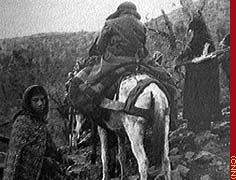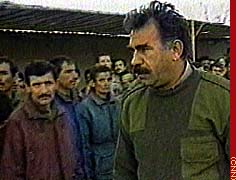
 |
|
| Displacement is a recurring theme in Kurdish history | |
The "Kurdish question" is more than anything else a Turkish question.
Kurds are the largest ethnic group (10-12 million) in Turkey's population of 63 million. Turks and Kurds, among other ethnic and religious groups, are the heirs of the multi-ethnic and multi-cultural Ottoman Empire that was dismantled following World War I. The Republic of Turkey that was established in 1923 started off with a pluralistic vision of its cultural heritage. The state was not named after its founding majority, the Turks, but rather after the political geography it was based on: (Republic of) Turkey. Indeed, Turkey was the home of Turks, Kurds, Greeks, Armenians, Albanians, Bosnians, Arabs etc.
However, after population exchanges with Greece in 1924, and a major Kurdish rebellion in southeastern Turkey in 1925, official inclination towards pluralism was abandoned. What could be termed as unity created out of diversity gave way to uniformity. The ideological tool of nation building became Turkish nationalism.
Members of other ethnicities would accept the Turkishness declared by the administration to be a political construct, or be assimilated - either peacefully or forcefully. Among the ethnic groups accepted or assimilated were most urban Kurds. However in a country which was 80 per cent rural/agrarian in the 1920s, approximately 90 percent of the Kurds were living in the countryside divided along tribal lines and as clients of powerful Kurdish landlords. Tribal cleavages were further aggravated by a keen competition over meagre resources. Violent clashes over water, pastures and cultivable land prevented the development of political solidarity, if not a cultural identity.
Peace and order could have prevailed in the Kurdish provinces of southeastern Turkey if the republican administration had not started to force local communities to obey the new national leadership, which was intent on modernization and control of all vestiges of life. The republican government began to thereby undermine the power of local traditional authorities -- tribal chieftains, big landlords and religious sheikhs.
Used to exercising their authority over their people, Kurdish rulers were very upset over this enchroachment into their turf. Successive rebellions from 1925 to 1937 left southeastern Turkey under a state of siege.
A deal was struck with the Kurdish rulers in return for public order but that agreement left the area undeveloped, out of touch with the rest of society and a punishment for unruly civil servants. The government invested little in the area, not trusting it because of its rebellious character. In short, the poverty and detachment, together with the traditional nature of the southeast, rendered the area to be the least integrated part of Turkey. This has hampered Turkey's development as well as its integration with the rest of the world.
It was not until the early 1970's that a strong Kurdish movement appeared on the political scene. Some Kurds took part in the Turkish leftist movement which accommodated them. However, in the wake of two military coups in 1971 and 1980, the more militant Kurds dissasociated themselves from the Turkish left, which had been crushed by the army. So the more intellectual, urban and elite ingredients in the Kurdish movement were drained off, leaving behind a younger, inexperienced, rural and adventurist cadre which opted for armed struggle.
This group had been socialized in a culture of conflict -- infatuated with firearms but also influenced by the heavy handedness of security forces against the expression of Kurdishness. This is not well known to the great majority of the Turkish people. The souring of Kurdish sentiments and trust in the administration has led to widespread discontent and armed rebellion by the most radical factions.
After the 1980 coup the Kurdish language was banned by the military administration, and names of Kurdish towns and villages were changed. Kurdish families were forced to give Turkish names to their children. Fortunately this ban and the prohibition of Kurdish publications were removed in 1991. However the scar of humiliation has remained in the Kurdish psyche till this day, exacerbated by the rejection of other demands like education and broadcasting in the Kurdish language.
 |
|
| Ocalan speaks with PKK troops at a training base | |
The Workers Party of Kurdistan (PKK) was conceived in this atmosphere of frustration. It was founded in 1978 by a university drop-out (from the Faculty of Political Science of Ankara University where the author of this article teaches) from the rural southeast. His name: Abdullah Ocalan. After years of preaching along Marxist-Leninist and Kurdish nationalist lines (although they may seem contradictory) and recruiting militants, the PKK staged its first terrorist act, in 1984, killing more than a dozen people.
Although the organization was home-grown and was recruiting in Turkey, Ocalan and his close associates had taken refuge in Syria after the 1980 military coup. Damascus sheltered, trained and equipped this runaway Kurdish group, which grew like a snowball. One reason the PKK gained in influence is that the Turkish government shut down all rival democratic Kurdish organizations and repressed all forms of expression of Kurdishness.
The Kurdish political scene was as dry as the desert and the PKK was seen as the only visible and available oasis. Moreover, the PKK was ready to make the sacrifices required by armed struggle on mountaintops.
The guerrilla group had to confront a stronger regular army, but at first, at least, it seriously hurt the ill-prepared troops who had no knowledge of guerilla combat, nor were equipped for the purpose. In the 1980s, the superiority of the PKK was clear - it staged hit-and-run attacks and escaped into mountainous territory. It was only in the 1990s that the Turkish army trained commando troops and special police forces and outfitted them with new equipment, including helicopters, which Kurdish guerrillas dreaded most.
With these reinforcements the Turkish armed forces got the upper hand first in the cities, then in the rural areas.
The PKK's effort to gain a footing or acquire a broker's position in northern Iraq was aborted by frequent Turkish operations into Iraq. Turkish operations into Iraq were facilitated by U.S. consent and eased by the reinforcement of the "no fly zone" over northern Iraq. Ankara also received cooperation from Masood Barzani's Democratic Party of Kurdistan, a rival Kurdish group which wanted the PKK out of its territory. However, Ocalan's entrenchment in Syria and that country's continuing support of the PKK made it impossible to eradicate the group completely. For Damascus, the PKK is a lethal instrument to pressure Turkey into a firm commitment to share the head waters of the Euphrates and Tigris, which are vital for both Syria and Iraq.
In 1998, the Turkish army brass lost its patience with Hafez al-Assad's Syrian administration ( as well as its hope in Turkish politicians) and threatened to attack Syria if Ocalan was not squeezed out. The recent strategic military agreement between Turkey and Israel left little choice for President Assad, who by then had already made his point through his effective use of the PKK. Ocalan started his career as a "global wanderer" in the autumn of 1998 and ended up in a Turkish jail in February 1999.
 |
|
| Kurdish refugees living in the mountains of northern Iraq | |
Barring Italy's blunders and Germany's reluctance to prosecute Ocalan, Europe has demonstrated sufficient determination not to give support to terrorism by shutting its doors to the guerrilla commander. But it fell short of trying him on its territory as the European convention against terrorism requires. Only Greece and Greek Cypriots fell prey to the "my enemy's-enemy-is-my-friend" trap.
The PKK may be truncated and beheaded, but what about the grievances and cultural demands of Kurds born out of economic deprivation and socio-political exclusion? The Kurd sense of victimization has been looked upon by Turkish administrations as a sign of subversion or treason. Will these problems be addressed now? When? These two questions await answers.
Turkish officialdom says there's no Kurdish problem; only a terrorism problem. This position has led to the awkward inference that "the Kurds have a Turkish problem." Indeed the unresponsiveness of the Turkish establishment to the Kurds' grievances has added to the artificial ignorance for which Turkey is paying a heavy toll -- with its sons' lives, its valuable economic resources, social solidarity and international reputation.
The capture of Ocalan is a golden opportunity for Turkey to solve this home-grown problem domestically. The much-lamented "foreign intervention" -- in the sinister form of aid to terrorists, or the innocent admonishment regarding more cultural rights or the state of the country's legal standards -- will ease to a great extent. If not, whatever remains of the PKK will serve as a mercenary force to the highest bidder in the Middle East with unsettled scores with Turkey.
On the other hand, the unsettled "Kurdish question," which is now internationalized, may find a new leader who is more suitable to the new circumstances. Ocalan is not fit for the leadership role of a peaceful political organization that extends from the Middle East to the Caucasus, all the way to Europe and the U.S. His extreme authoritarian and cruel character leaves no place for conciliation. His leadership style, forged as a guerrilla commander, has served its purpose. Now he is history. One hopes under sentimental public pressure, the Turkish authorities do not turn a criminal into a martyr or at best, a victim by ridiculing him.
Let us assume for one moment that a new Kurdish leader appears on the political stage, which was controlled by the PKK and the Turkish armed forces until now. This leader may wear a bow tie or a silk dress and speak several western languages and never advocate violence. Is the Turkish government ready to confront and meet all the reasonable Kurdish demands voiced by this man or woman? Especially if the whole world likes this person and supports him or her?
We Turks accuse the "West" of confusing the PKK (terrorism) with the "Kurdish Problem," but we do the same. Now it is time to respect cultural differences and protect them legally while affording no special privilege to any ethnic or religious group.
This is no time to show off, with one foot on the hunted criminal. It is time to prove that Turkey is a country where the rule of law reigns. While judging Ocalan, let us lift capital punishment and release incarcerated Kurdish members of Parliament who were arrested on charges of being accessories to a terrorist organization. Their prison terms are coming to an end anyway. Let us not allow adventurous prosecutors or judges with an eye on future political careers or the State Security Court, to hijack this opportunity. Let us show the world that we did not capture Ocalan to hang but to judge.
Let this trial be a judgement of us, a chance to end this bloody adventure through reason and common sense. Let us allow political parties and actors to appear on the stage and compete with each other, no matter who they are, provided they do not condone violence. It is time to reward the Turkish and Kurdish citizens of this country for not becoming each other's enemy despite the provocation of chauvinists on both sides. If Ocalan serves this cause, this would be his greatest service to humankind, although he has only brought blood and tears so far.
Next Page- The Kurds' Grievances